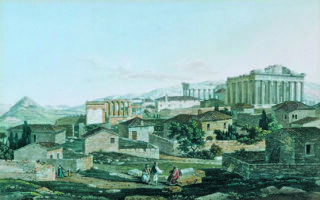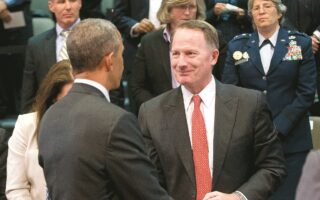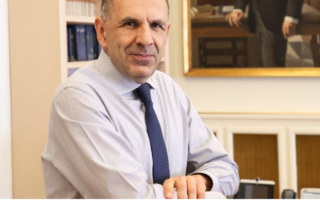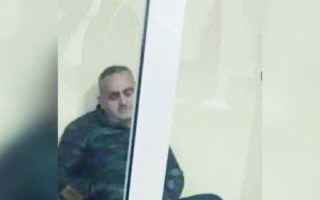Greece is India’s ‘gateway’ into the EU
India's prime minister says he wants to see companies from the two countries create value chains in the European market
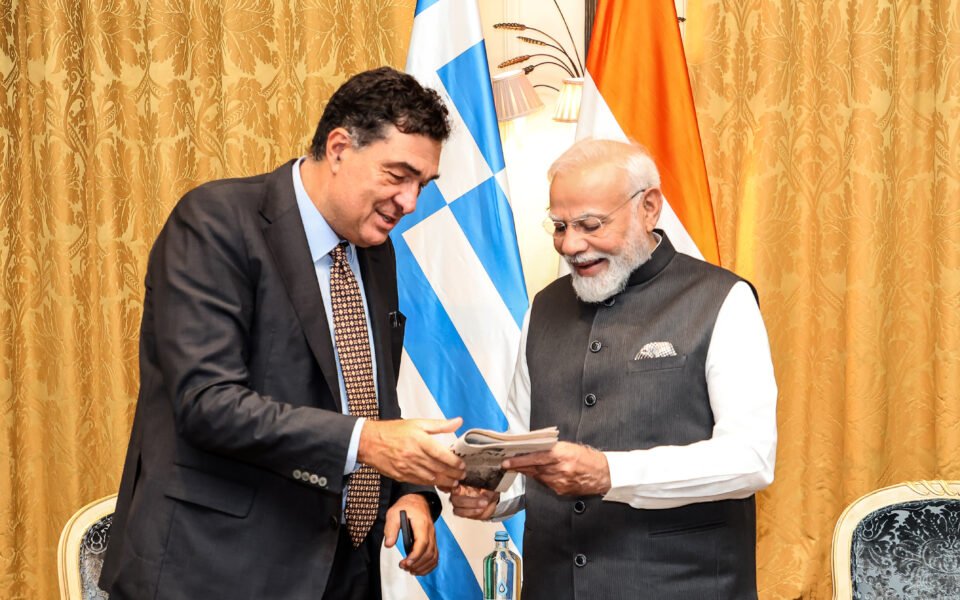
It took 40 years for an Indian prime minister to visit Athens, since Indira Gandhi came to Greece in September 1983. Narendra Modi represents a very different country today compared to what India was in the 1980s. It is now an emerging, rapidly developing superpower, which aspires to lead the countries of the Global South in a multipolar world.
Speaking to Kathimerini, Modi was forthcoming about his ambitions for his country and declared that he is ready to deepen cooperation with Greece at all levels, including security.
What is the purpose of this visit?
I feel you should rather be asking why no Indian prime minister has visited Greece for over four decades. On a serious note, I have known Prime Minister [Kyriakos] Mitsotakis for a while now. We have met on the sidelines of the UN General Assembly. I thank him for his kind invitation. I believe that a closer, more strategic relationship between India and Greece will be good not just for the two countries but also for Europe and Asia. I would like to work closely with Prime Minister Mitsotakis to start a process that will significantly upgrade our bilateral ties.
Do you see potential for more investment and travel between the two countries?
Given its location and our historically close ties, I see Greece as an important economic, logistic and strategic gateway for India into the European Union and the Eastern European region in general. There are great opportunities for Indian and Greek businesses to come together. There is a commitment at the political level to see that this happens. Prime Minister Mitsotakis has shown excellent leadership over the last four, five years in managing the Greek economy, which has successfully transitioned from a crisis-ridden economy to a bright zone in Europe. That is quite an achievement and opens up new possibilities in our relationship.
Indian companies are always looking to invest abroad. Our “Make in India” program is transforming India into a global manufacturing hub. I would like to see Indian and Greek companies using the Hellenic Republic’s strategic geography to create value chains linking Indian and Greek companies to the wider EU market.
Are military ties going to be strengthened?
India’s relationship with the Hellenic Republic has always had a strategic dimension, covering the economic, political and security spheres. The time has come to significantly upgrade our bilateral ties in all its dimensions. I do not see any limitations to such a process.
You have implemented major economic reforms in India. What were the challenges you had to deal with and what is your vision for the country?
I am glad you have been following our reform journey in India. We have done numerous reforms and all our reforms were aimed at improving the lives of our people and improving the ease of doing business. When it comes to the process of deep structural reform, the most important aspect is to take all stakeholders along, to get their trust and participation. Whether it is reforms in the economic space or in the financial space or in ensuring ease of doing business, when the people saw that the intent and content of our reforms is right, we won their trust. During implementation, we ensured that we constantly stayed with the people’s pulse and made calibrated changes wherever necessary.
As a result, today, even during a global economic crisis, India is a major economic bright spot, foreign direct investments are breaking records, we have 100 unicorn startups and over 100,000 startups thriving, exports are at unprecedented levels, manufacturing is growing in leaps and bounds, and banks and financial institutions are at their healthiest. We have always stressed last-mile delivery. And we are delivering even growth to the last mile.
Our reforms in the delivery of public welfare through digital public infrastructure ensured that even during the pandemic, we could directly reach the people who needed help the most with financial and other kinds of assistance. Our reforms in the social infrastructure space have been taking drinking water connections, electricity connections, bank accounts, free health insurance coverage to millions of people. This has ensured that people are free to live up to their full potential instead of just scouting for the basic necessities of life. At the same time, the capacity addition in educational institutions has been unprecedented. These holistic reforms have taken the fruits of growth to every section of society. As a result, a recent survey indicated that nearly 135 million people had risen out of poverty in India in just a span of five years. These people will fuel a fresh wave of growth with their aspirations. In the last 10 years, India jumped from the 10th largest economy in the world to the fifth largest. We are making efforts to soon become one of the top three economies of the world.
You often talk about the need for a new world order that will reflect changing realities and geopolitical balances. What do you mean specifically?
Not only India, but also other members of the United Nations have been highlighting that the world in which we live today is very different from the world that existed when most of the major institutions of global governance were created. Unfortunately, these institutions have not kept up with the times and risk irrelevance if they don’t change rapidly. The current crisis within the UN system and its key organs such as the Security Council is a good example of what I am talking about. There needs to be representation for the voice and aspirations of the developing world. I am coming from the 15th BRICS Summit in South Africa. We have decided to expand the BRICS forum and make it more representative and inclusive. In the G-20, during our Presidency we have taken the initiative to give full membership to the African Union. We hope these would act as an impetus to take reforms of other global institutions to a logical conclusion.
Do you consider India to be a leader of the Global South? Does its position as the most populous state change its global status?
A fundamental principle of our foreign policy is that we must never divide the world into “North” or “South,” “Leader” or “Follower.” We are all sovereign and equal nations. We also must ensure that ‘no one is left behind.’ We see India’s role as a shoulder whose support can be used by the countries of Global South to leapfrog. When India does well in terms of its economy, the countries of the Global South also get confidence. When India lands on the moon, it also gives wings to the aspirations of countries of the Global South. When India excels in digital payments, it gives impetus to the digitization efforts of the countries of the Global South.
It is very important that countries of the Global South feel that their concerns and aspirations are heard. The stability of the world order depends on how much the Global South trusts it. For the peace, security and prosperity of the international community, it is not possible for us to bypass or ignore the problems in developing countries in Africa, Asia and Latin America merely to preserve the prerogatives of a few.
It is with this spirit, after taking over the G-20 Presidency, that the first event we organized was the Voice of Global South Summit. One hundred and twenty-five countries from the developing world participated. After hearing their views and priorities, we set the G-20 agenda for our Presidency. It is my firm belief that we need to give the Global South their due representation and voice at all international platforms. Only then we can move forward on sustainable global growth.
Are western values still universal? Should they be espoused by all countries or do we need more diversity?
Today, the world is a highly connected place. Rather than thinking of values using 20th century prisms such as Western, Eastern, etc, I think our values should be human-centric. As long as our values further prosperity for all, leaving no one behind, while furthering harmonious coexistence, it does not matter what name we give to our values. Human-centric values are universal in nature, while also respecting the uniqueness of different cultures without expecting uniformity from everyone. In many places, there is a notion that diversity must be accommodated. But in India, diversity is not only respected but also celebrated and actively nurtured. India is a good example of how to make diversity a strength. This has been the essence of the Indian cultural and political systems. Our vibrant culture with many regions, religions and languages has great diversity embedded in a strongly democratic political system. I cannot think of a stronger argument than India’s human-centric cultural ethos for respecting diversity.
You had an excellent meeting with US President Joe Biden recently, but India has also been criticized in terms of how it is dealing with sanctions towards Russia. How do you see the conflict in Ukraine ending and how is India positioning itself?
I think no one disagrees that we live in an era where diplomacy should to be prioritized over war and conflict. India has the resolve and ability to pursue our national interest for the benefit of our people and the maintenance of international peace and security. We have consistently advocated for diplomacy and dialogue to resolve the Ukraine issue. We firmly believe that this is not just a political or economic issue, but above all, it is an issue of humanity. The effect of the continuing conflict has been more on the developing world. India stands ready to support all genuine efforts to bring peace and stability in the region.
